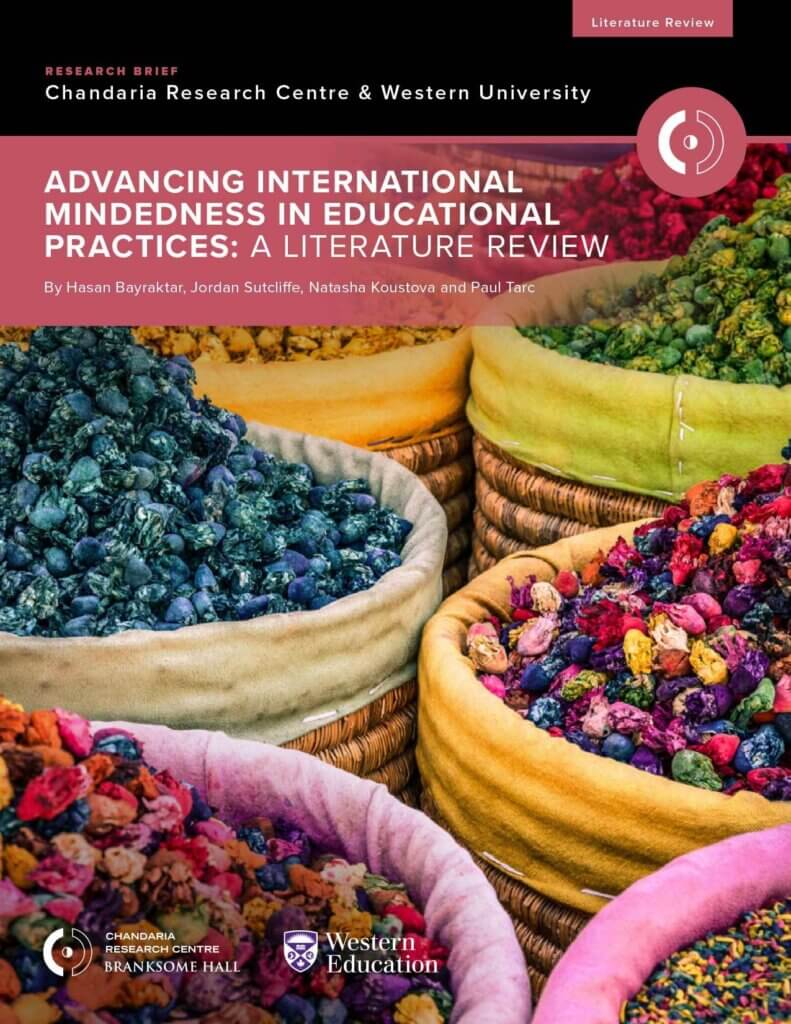Andreotti, V. (2014). Soft versus critical global citizenship education. In S. McCloskey (Ed.), Development education in policy and practice (pp. 21–31). Palgrave Macmillan.
Andreotti, V., & de Souza, L. M. T. M. (Eds.). (2012). Postcolonial perspectives on global citizenship education. Routledge.
Belal, S. (2017). Participating in the International Baccalaureate Diploma Programme: Developing international mindedness and engagement with local communities. Journal of Research in International Education, 16(1), 18–35. https://doi.org/10.1177/1475240917702789
Bennett, J. M. (Ed.). (2015). The SAGE encyclopedia of intercultural competence. Sage Publications.
Bunnell, T. (2019). Developing and institutionalising the ‘Internationally-Minded School’: The role of the ‘numerous Fs’. Journal of Research in International Education, 18(2), 186–198. https://doi.org/10.1177/1475240919865792
Castro, P., Lundgren, U., & Woodin, J. (2013). Research report: Conceptualizing and assessing international mindedness (IM): An exploratory study. https://www.ibo.org/research/curriculum-research/cross-programme/conceptualizing-and-assessinginternational-mindedness-im-an-exploratorystudy-2013/
Castro, P., Lundgren, U., & Woodin, J. (2015). International mindedness through the looking glass: Reflections on a concept. Journal of Research in International Education, 14(3), 187–197. https://doi.org/10.1177/1475240915614202
Culross, R., & Tarver, E. (2011). A summary of research on the International Baccalaureate Diploma Programme: Perspectives of students, teachers and university admissions offices in the USA. Journal of Research in International Education, 10(3), 231–243. https://doi.org/10.1177/1475240911422139
Dervin, F., Paatela-Nieminen, M., Kuoppala, K., & Riitaoja, A. L. (2012). Multicultural education in Finland: Renewed intercultural competences to the rescue? International Journal of Multicultural Education, 14(3), 1–13. https://doi.org/10.18251/ijme.v14i3.564
Franch, S. (2020). Global citizenship education: A new ‘moral pedagogy’ for the 21st century? European Educational Research, Journal, 19(6), 506–524. https://doi.org/10.1177/1474904120929103
Goren, H., & Yemini, M. (2017). Global citizenship education redefined – a systematic review of empirical studies on global citizenship education. International Journal of Educational Research 82, 170–183. https://doi.org/10.1016/j.ijer.2017.02.004
Hacking, E. B., Blackmore, C., Bullock, K., Bunnell, T., Donnelly, M., & Martin, S. (2017). The international mindedness journey: School practices for developing and assessing international mindedness across the IB continuum. https://www.ibo.org/research/outcomes-research/continuum-studies/theinternational-mindedness-journey-school-practicesfor-developing-and-assessing-internationalmindedness-across-the-ib-continuum-2017/
Hacking, E. B., Blackmore, C., Bullock, K., Bunnell, T., Donnelly, M., & Martin, S. (2018). International mindedness in practice: The evidence from International Baccalaureate schools. Journal of Research in International Education, 17(1), 3–16. https://doi.org/10.1177/1475240918764722
Harwood, R., & Bailey, K. (2012). Defining and evaluating international mindedness in a school context. International Schools Journal, 31, 77–86.
Hill, I. (2012). Evolution of education for international mindedness. Journal of Research in International Education, 11(3), 245–261. https://doi.org/10.1177/1475240912461990
International Baccalaureate Organization (2013). Learner Profile. https://www.ibo.org/contentassets/fd82f70643ef4086b7d3f292cc214962/learnerprofile-en.pdf
Marginson, S., & Sawir, E. (2011). Ideas for intercultural education. Palgrave MacMillan.
Norman, T. D. (2022). A scoping review of international mindedness and related concepts in music education, 2000–2020. Review of Education, 10(1), e3347. https://doi.org/10.1002/rev3.3347
OECD. (2018). Preparing our youth for an inclusive and sustainable world: The OECD PISA global competence framework. https://www.oecd.org/en/topics/sub-issues/global-competence/pisa-2018-global-competence.html
Oxley, L., & Morris, P. (2013). Global citizenship: A typology for distinguishing its multiple conceptions. British Journal of Educational Studies, 61(3), 301–325. https://doi.org/10.1080/00071005.2013.798393
Oxfam (2015). Education for global citizenship: A guide for schools. https://oxfamilibrary.openrepository.com/bitstream/handle/10546/620105/eduglobal-citizenship-schools-guide-091115-en.pdf?sequence=11&isAllowed=y
Pashby, K., da Costa, M., Stein, S., & Andreotti, V. (2020). A meta-review of typologies of global citizenship education. Comparative Education, 56(2), 144–164. https://doi.org/10.1080/03050068.2020.1723352
Penny, T. (2019). Leading international-mindedness: Leadership and culture [Master’s thesis, Tampere University of Applied Sciences]. Theseus. https://urn.fi/URN:NBN:fi:amk-2019120424519
Rizvi, F. (2009). Towards cosmopolitan learning. Discourse: Studies in the Cultural Politics of Education, 30(3), 253–268. https://doi.org/10.1080/01596300903036863
Savicki, V. (Ed.). (2008). Developing intercultural competence and transformation: Theory, research and application in international education. Routlege.
Segovia-Pérez, M., Laguna-Sánchez, P., & de la Fuente-Cabrero, C. (2019). Education for sustainable leadership: Fostering women’s empowerment at the university level. Sustainability, 11(20), 5555. https://doi.org/10.3390/su11205555
Shultz, L. (2007). Educating for global citizenship: Conflicting agendas and understandings. Alberta Journal of Educational Research, 53(3). https://doi.org/10.11575/ajer.v53i3.55291
Singh, M., & Qi, J. (2013). 21st century international mindedness: An exploratory study of its conceptualization and assessment. International Baccalaureate Organization. https://www.ibo.org/research/curriculum-research/crossprogramme/21st-century-international-mindednessan-exploratory-study-of-its-conceptualization-andassessment-2013/
Sriprakash, A., Singh, M., & Qi, J. (2014). A comparative study of international mindedness in the IB Diploma Programme in Australia, China and India. International Baccalaureate Organization. https://www.ibo.org/research/outcomes-research/diploma-studies/a-comparative-study-ofinternational-mindedness-in-the-diplomaprogramme-in-australia-china-and-india-2014/
Tarc, P. (2012). How does ‘global citizenship education’ construct its present? The crisis of international education. In V. Andreotti & L. M. Menezes de Souza (Eds.), Postcolonial perspectives on global citizenship education (pp. 105–123). Routledge.
Tarc, P. (2019). “Walking the talk”: A conceptualization of international mindedness to inform leadership in international schools. Peabody Journal of Education, 93(5), 486–499. https://www.tandfonline.com/doi/abs/10.1080/0161956X.2018.1515835
Tarc, P. (2023). K-12 global/international education: Dancing with “diversity, democracy, and social justice.” in R. Tierney, F. Rizvi, K. Ercikan, & G. Smith (Eds.), International encyclopedia of education: Vol. 2. Diversity, democracy, and social justice in education (4th ed., pp. 139–150). Elsevier. https://doi.org/10.1016/B978-0-12-818630-5.08026-X
UNESCO (2013). Global citizenship education: Preparing learners for the challenge of the 21st century. https://education4resilience.iiep.unesco.org/en/resources/2014/global-citizenship-educationpreparing-learners-challenges-21st-century
UNESCO (2016). Education for people and planet: Creating sustainable futures for all. Global Education Monitoring Report. https://www.unesco.org/gemreport/en/education-people-and-planet
Van Oord, L. (2007). To westernize the nations? An analysis of the International Baccalaureate’s philosophy of education. Cambridge Journal of Education, 37(3), 375–390. https://doi.org/10.1080/03057640701546680
Wasner, V. (2016). Critical service learning: A participatory pedagogical approach to global citizenship and international mindedness. Journal of Research in International Education, 15(3), 238–252. https://doi.org/10.1177/1475240916669026

